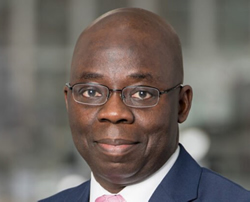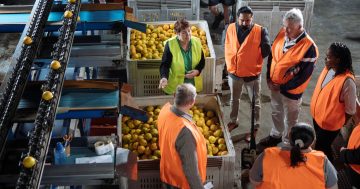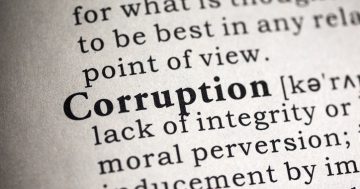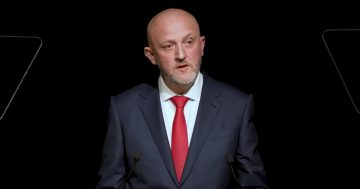Matt Ross* talks to World Bank Governance Director, Edward Olowo-Okere who has spent the past three years working to improve public services and financial management in low- and middle-income countries.
 “Corruption is really the most daunting development challenge,” says Edward Olowo-Okere.
“Corruption is really the most daunting development challenge,” says Edward Olowo-Okere.
“I don’t just mean in the low-income countries, but also the middle-income ones.”
His view is built on long experience. Throughout his 24-year career at the World Bank, Olowo-Okere (pictured), a former university lecturer originally from Nigeria, has specialised in public sector financial management.
Given the range of obstacles holding back development — from weak inward investment to heavy debt burdens; from crumbling national infrastructures to sclerotic bureaucracies — Olowo-Okere’s strong focus on corruption is striking.
However, the reality is that corruption fosters and exacerbates many of these other problems.
Investors stay away because demands for backhanders increase the cost of doing business; corrupt officials collect bribes rather than taxes and fees, increasing national deficits; infrastructure is shoddily built by cowboy firms that have bought their contracts.
All the while bureaucrats fiercely defend the slow, inefficient systems that create a market for costly short-cuts.
“Corruption diverts resources away from where they’re most needed,” Olowo-Okere says.
“Funds that would have been used to have better health, better education, better roads and better infrastructure are pocketed by a few people.
“The impact is that you have poor infrastructure and poor service delivery, affecting the standard of living of the majority of the people; then you have a few people with a lot of money, living in luxury.”
When corruption becomes embedded in a country’s public services, everyday activities, like registering a business or getting a driving license, involve paying a bribe.
This holds back economic growth, while empowering and enriching the dishonest, further increasing their stranglehold on the system.
So corruption deepens and perpetuates many of the problems affecting low- and middle-income countries, but both its causes and consequences are global.
He believes Public Servants in the rich world have a crucial role to play in challenging it.
“They can make sure that the countries they support, in terms of giving overseas development assistance, are implementing the right policies and controlling corruption,” Olowo-Okere says.
Where countries fail to do so, Governments in the industrialised world should “find better ways to channel these resources directly to the people that they want to help”.
However, that is just the start. “If nobody’s willing to give, then corruption cannot thrive. It does take two to tango: you have to have the receiver and the giver.”
International businesses seeking contracts — for road construction or mineral extraction, for example — are often asked for baksheesh.
Olowo-Okere points out that some rich countries have legislated to criminalise the payment of bribes overseas by their companies and businesspeople.
“Where you have rules in the developed world that hold these people accountable, that can deter businesspeople from those countries from giving bribes,” he says.
“I think countries who are not yet doing that should introduce these rules and processes. Enforcement is also important.”
Meanwhile, wealthier nations can deny corrupt officials and politicians a safe haven for their stolen assets.
“Most of the receivers of the proceeds of corruption are not comfortable retaining the resources within their own countries,” he says.
“They invest them in property and businesses abroad. The developed world can prevent these resources from being brought to their countries illegally.
“Or where they are brought to their countries illegally, they can find a way to seize those resources and get them back to the people they belong to.”
Here, most rich world nations could do more.
Olowo-Okere praises United Kingdom legislation outlawing the payment of bribes, for example, but notes the high levels of investment in British real estate by politicians from some of the Commonwealth countries.
Increasing the pressure, he believes, would generate benefits for developed countries as well as poorer nations. After all, “corruption is not just a low-income country challenge”.
During the pandemic, for example, “a lot of people saw the opportunity to profit. The rest of the world saw misery and debt and so on and so forth, but they saw a good opportunity to enrich their pockets.
“These bad people are not only in the developing world; they’re also in the developed world.”
The rush to procure personal protective equipment (PPE) led to “various forms of corruption where, for example, masks were being bought at 10 times the normal price”.
The solution, he says, is to prepare in advance for such crises — producing “proper procedures for emergency procurement that anticipate the risks of corruption” and block those opportunities.
Digital procurement platforms can be helpful here, he says, boosting transparency to tackle corruption, while enabling Public Service buyers to access broad, competitive supplier markets online at times when other routes to market are disrupted.
“If people in leadership positions really want to do the right thing, then even in an emergency they can do that,” Olowo-Okere believes.
“If they don’t want to do the right thing, they can invoke emergency rules or declare a state of emergency – and decide to do whatever they want in order to enrich themselves.”
*Matt Ross is Global Government Forum’s Contributing Editor, providing direction and support on topics, products and audience interests across the Forum’s editorial, events and research operations.
A fuller version of this article appears on the Global Government Forum website.











